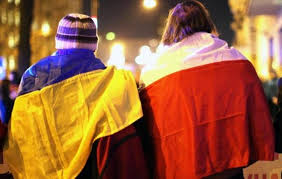What do Ukrainians think of Poland and Poles – a study
19 December 2024 11:49
At the request of the Polish Meroshevsky Center, the Ukrainian Info Sapiens studio conducted a survey in the first half of November this year, asking Ukrainians from different parts of the country, except for Crimea, Sevastopol and other territories temporarily occupied by Russia, about their attitudes toward Poland and Poles. The results of the survey “Poland and Poles through the eyes of Ukrainians” were reported by the Polish edition of Rzeczpospolita, "Komersant Ukrainian" reports.
The mood of Ukrainians is becoming pragmatic, and assessments are neutral
34 percent of Ukrainians do not see any serious problems in relations with Poland, but more than half of those polled do.
First, it is the border blockade and the grain crisis (26%) and more general economic problems (3%), meaning similarity of markets and competition, especially in the agricultural sector. In other words, 29% of respondents pointed to economic issues.
Other bottlenecks in relations between Ukraine and Poland include the Volyn tragedy (19 percent), the figure of Stepan Bandera, and territorial disputes (6 percent). In general, historical issues are mentioned as problematic in a quarter of all responses. Finally, 4 percent of respondents noted the poor treatment of Ukrainians and refugees.
At the same time, the number of respondents with a negative attitude remains small: only 2 percent have a bad opinion of Poles, compared to 1 percent in 2023, and two years ago there were no such responses at all. However, the group of neutral opinions is growing: from 15% in 2022 to 53% now.
The Meroshevsky Center states that the mood of Ukrainians is becoming pragmatic.
Today, the majority of respondents perceive Poles as neighbors (70%), which is neutral compared to terms such as allies, friends, and brothers (31, 20, and 5%, respectively). Respondents consistently point to good neighborliness as the desired form of Polish-Ukrainian relations in the future (49 percent in 2024, 51 percent in 2023, and 40 percent in 2022).
What influences changes in Ukrainians’ assessments?
First of all, the protests of Polish farmers at the border had a rather negative response in the hearts and minds of Ukrainians. Moreover, there was a lack of strategic communication on the Polish side.
As Dr. Agnieszka Bryc of the Nicolaus Copernicus University in Toruń explains, “For Poland, this issue had a purely political dimension, while for Ukrainians it was more about dignity.”
“They interpreted the throwing of grain from the wagons as disrespect for their hard work. Moreover, this is a shocking association, since the Great Famine is a living trauma of Ukrainian society. Since Ukrainians could not find a rational explanation for the phenomenon of grain throwing, the door was opened for conspiracy theories. Let’s remember that Russians are great at spreading them,” emphasized Dr. Agnieszka Bryc.
According to Bartosz Cichocki, former Polish Ambassador to Ukraine, the local Ministry of Agrarian Policy missed the moment when the unconditional opening of the EU market to goods and services from Ukraine caused outrage among farmers and carriers struggling to survive the crisis.
“The previous government, as well as the current one, did not have the courage to talk seriously with farmers and carriers, and Ukrainians saw it. We, in turn, see the problem in the lack of Ukrainian reaction to the sequestration of Polish companies in the local market, as well as the behavior of Ukrainian companies and refugees in Poland,” Bartosz Cichocki said.
The Russians are trying to make Poles and Ukrainians quarrel
Russian propagandists are always ready to stir up a sensitive topic, whether it is grain, historical heritage, or Poland’s alleged intentions to annex part of Ukraine. This also has a certain impact on the opinions of Ukrainians.
For example, the Meroshevsky Center asked Ukrainians what they thought about Poland’s intention to occupy western Ukraine.
As it turned out, 60 percent believe that this is an outright lie, but 30 percent assume that something like this could happen. And 4 percent perceive this statement as true.
The number of respondents who chose the option: “It considers part of the land to be its own” when asked why Poland helps Ukraine has increased to 20 percent, up from 6 percent in 2022 and 11 percent in 2023.
However, it is gratifying that the vast majority of Ukrainians have other explanations: they justify Poland’s assistance by the fact that Poles consider Russia their enemy and feel threatened by it, as well as by compassion and good relations with their neighbor.
The survey participants were also asked which European country has helped Ukraine the most in military and humanitarian terms. Accordingly, 34% of Ukrainians named the United Kingdom, followed by Germany (29%) and Poland (23%). For comparison, France comes next with a 3% assessment of assistance.









